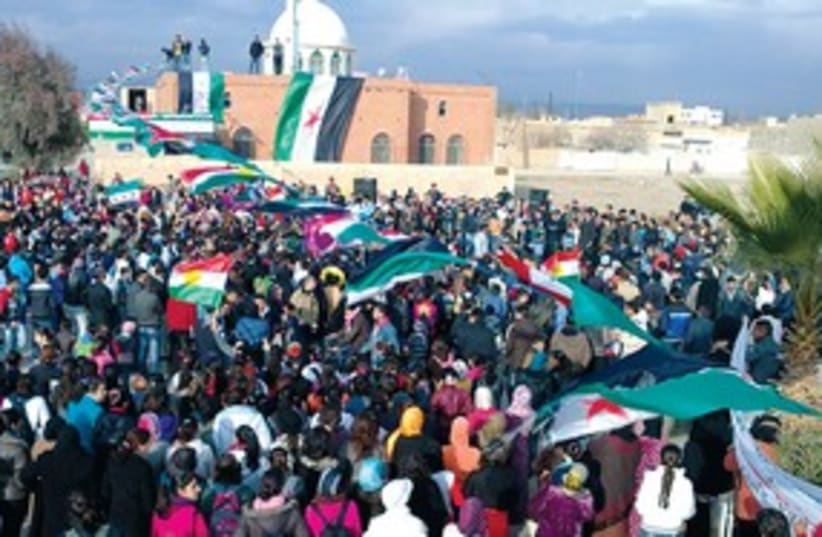CAIRO - Arabs will end their observer mission to Syria and will ask the UN Security Council to send an international peacekeeping force to end the bloodshed there, according to a draft resolution obtained by Reuters on Sunday.
Arab ministers met in Cairo to revive diplomatic efforts after Russia and China vetoed a UN resolution that called for President Bashar Assad to step aside. That resolution was based on an Arab peace plan and had Western backing.
The draft resolution also called for tighter implementation of economic sanctions Arabs previously imposed on Syria, halting diplomatic cooperation with Syria and called for providing aid and political support to the Syrian people.
As part of the Arab efforts, Tunisia said it would host the first meeting on Feb. 24 of a "Friends of Syria" contact group made up of Arab and other states and backed by Western powers.
"How long will we stay as onlookers to what is happening to the brotherly Syrian people, and how much longer will we grant the Syrian regime one period after another so it can commit more massacres against its people?" Saudi Foreign Minister Saud al-Faisal asked ministers at the start of the League session.
"At our meeting today I call for decisive measures, after the failure of the half-solutions," he said. "The Arab League should... open all channels of communication with the Syrian opposition and give all forms of support to it."
The draft proposed scrapping the Arab monitoring mission which had been sent to Syria in late December but which was criticized by Syria's opposition as ineffective from the outset. It also faced internal dissent and logistical problems.
The Sudanese general leading the observers quit on Sunday.
"I won't work one more time in the framework of the Arab League," General Mohammed al-Dabi, whose appointment had been criticized because of Sudan's own rights record, told Reuters.
"I performed my job with full integrity and transparency but I won't work here again as the situation is skewed," he added.
The draft resolution instead called for "the UN Security Council to send an international peacekeeping force to Syria".
Arab League chief Nabil Elaraby told the ministers he was proposing a new joint Arab-UN monitoring team to Syria, an idea he has already proposed to the UN secretary-general. That plan has drawn only lukewarm support from diplomats in New York.
Arab League agrees that Syria 'deserves freedom'
Arabs will also call for tightening sanctions that include halting investments and stopping financial dealings with the Syrian government. Analysts and diplomats say the measures have had limited impact so far because Iraq and other neighbors have not implemented them.
Although a senior Arab League official said ministers in the meeting were inclined to support Syria's opposition, Tunisian Foreign Minister Rafik Ben Adessalam said recognizing the Syrian National Council was "premature and requires the opposition get unified." But he called for action to help the Syrian people.
"The Syrian people deserve freedom as much as their brothers in Tunisia, Egypt, Libya and other Arab states that witnessed major political change," Ben Adessalam told ministers.
He announced that Tunisia would host the meeting of "Friends of Syria," a plan proposed by France and the United States after Russia and China blocked the Security Council resolution.
Qatari Prime Minister Sheikh Hamad bin Jassim al-Thani said the new forum would provide "a good opportunity to try to create a clear international direction to help the Syrian people to exit the crisis".
Gulf states have been leading moves to isolate Assad. They announced last week that they were recalling their ambassadors from Syria and expelling Syria's envoys.
Libya and Tunisia, both countries where popular revolts toppled authoritarian rulers last year, have done likewise.
The Saudi minister criticized the Security Council's failure to back the Arab plan for Syria but did not name Russia and China. Elaraby said the veto, cause of much Arab frustration, exposed the failings of the Council's voting system.
Diplomats at the United Nations said Saudi Arabia had circulated a new draft resolution backing the Arab plan for the General Assembly, rather than the Security Council, to consider. Assembly resolutions are non-binding but cannot be vetoed.
However, Riyadh denied on Sunday reports that it had formally presented the resolution to the assembly.
Egypt's news agency said Elaraby had proposed appointing former Jordanian minister and UN envoy to Libya, Abdel Elah al-Khatib, as the League's special envoy to Syria. But a source in the meeting said Khatib's name was not put forward.
